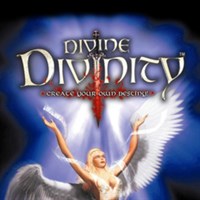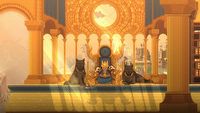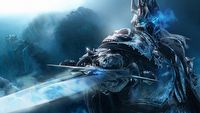First RPG From Creators of Baldur's Gate 3 is Holding Up. Without Divine Divinity, There'd Be no Larian as We Know It
Larian came a long way before it released three veritable behemoths of the RPG genre. The road that was concluded with Divinity: Original Sin 2 and Baldur's Gate 3 began with a highly successful hybrid of hack'n'slash and role-playing game – the imperfect, albeit great Divine Divinity.
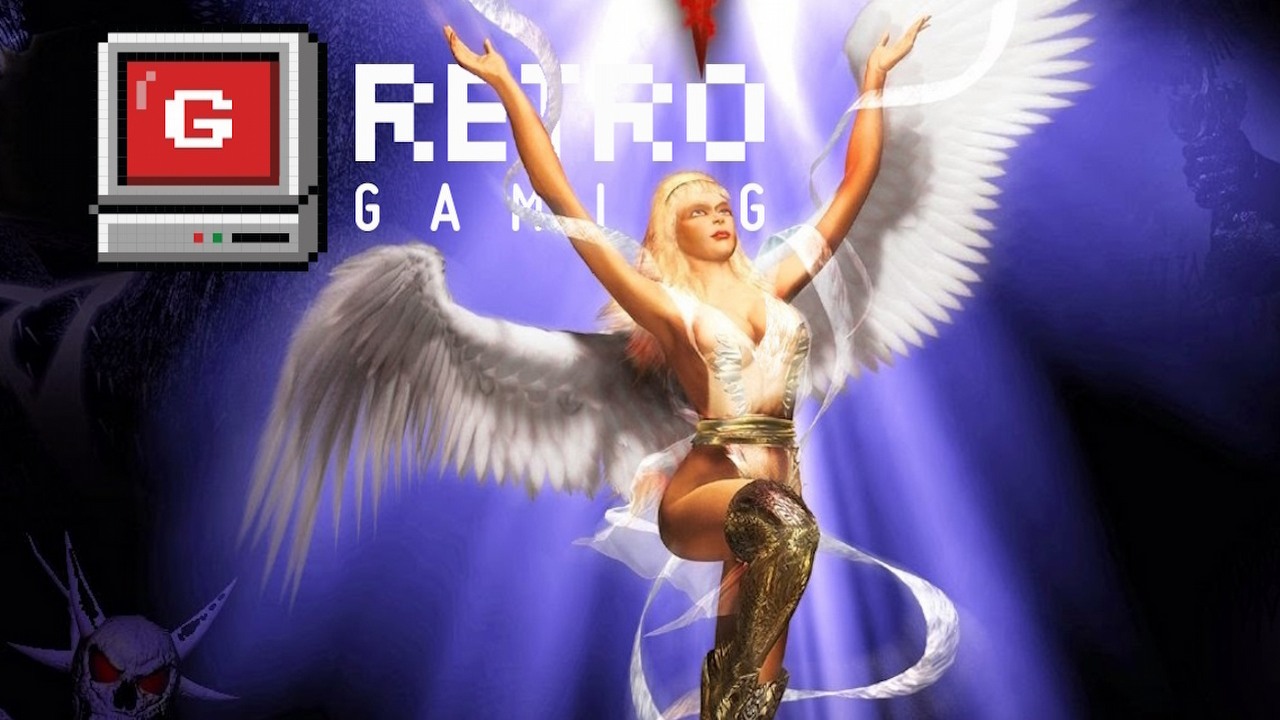
The year 2002 marked the end of a certain era. It was then that isometric RPGs began to fade into oblivion, even though such giants as Arcanum or the immortal Baldur’s Gate 2 had appeared just a moment earlier. Kult: Heretic Kingdoms, the cost-cutting Lionheart and Icewind Dale 2 released in the following 2 years were a swan song of that era. A moment later, three-dimensional RPGs took over - Knights of the Old Republic, Neverwinter Nights, Gothic 2, Morrowind and their successors. One of the few old-school, 2D RPGs that retained vigor during this transition period was Divine Divinity from the Belgian team Larian. The first trip to Rivellon remains one of the best to this day, even if this game wasn't perfect. This was simply the price for playing a game full of character.
Clichés with a twist
At first glance, Divine Divinity looks like a fairly stock imitation of more popular competitors, but that's just appearances. The first associations are very positive - we get a combination of dynamic combat and character development in the style of Diablo, a Baldur-inspired story and a large and interactive world like in the good old Ultima. A tempting mix, which promises the best of three worlds. In the end, despite adversity and the monumental scale of the project, the venture was successful.
Divine Divinity starts off simple enough. In a typical fantasy land like Rivellon, there are some issues - the ruler is not very good at his job, and the land is overrun by orcs. Meanwhile, an ancient evil is playing its game in the shadows. So, as a simple little thief, a Conan-sized fighter or a wizard, we jump right into the middle of the pot. We start in the village of the Source magicians (which we will learn more about in the Original Sin subseries - and then it turns out to be quite an original concept), where our path is crossed by a black knight, and then by a talking white cat and his sorcerer (they are actually partners, but this is according to my private canon, let's not digress).
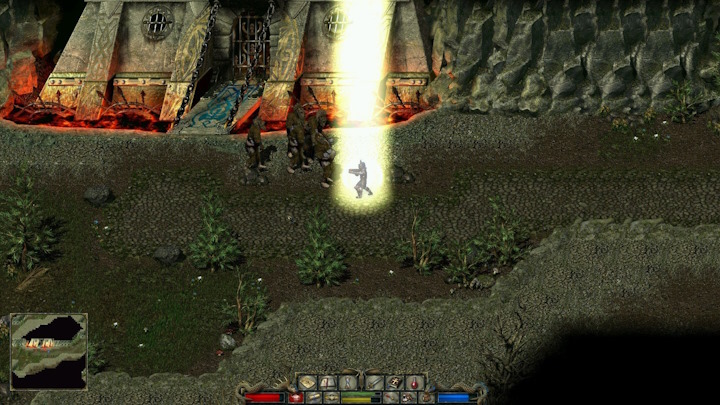
This could sound like the beginning of some cheap fantasy joke. And yet, it's the opening of a great adventure; the beginning of the path to destiny in Rivellon. The intrigue turns out to be more complex and convoluted than one might assume. The game includes politics, magic, ancient prophecies, and a lot of dark humor to balance the darkness and cruelty of the world. Divine Divinity is a game that, on the one hand, feels good in the convention on the verge of dark and heroic fantasy, and on the other hand, makes fun of it whenever it can, winks at the player - and conveys all this with the help of colorful dialogues. It's a mix of Terry Pratchett's humor, Mel Brooks, and Monty Python (it always has to be Monty) as well as situational jokes. Even today, years after Larian became more confident under its own banner, the first attempt still holds up in terms of writing.
And the scriptwriters had to do some writing to fill the world with content, because the game is huge. A powerful main storyline and vast side quests - as well as secrets - await discovery, which will drag us through a huge land, perhaps cut by three or four loadings. Divine Divinity will easily last you 50, if not 100 hours, and believe me, it will be a filling adventure. Although not without obstacles.
Enter the (small) dragon
What's so special about Divine Divinity, despite its seeming cliché and a title that was trashed by half of the gaming press on the day of release? Well, the vast majority of them were very well balanced with elements taken from the above-mentioned big three (Ultima still meant something back then). The fight, although not as fluid as in Diablo, was similar in weight and brought the same satisfaction, because it required wits, planning, investing points wisely and the getting the right gear - on top of dexterity and good timing. Beating monsters in real time, like in Diablo, simply gave us this primal sense of fun (even if we could pause and plan the next step, e.g. to select potions).
I'm not sure it still works, but in the version from several years ago, the invisibility potion + special warrior strike was a deadly combo, because I could freely hit the opponent until I ran out of mana. Attacking did not nullify invisibility. 10/10, highly recommend.
The kinship with Diablo was also clear in the atmosphere and color scheme - despite a slightly different camera placement. Either way, it was impossible to deny the kinship, even if Larian was more amused by the fairy tale than the bloody occultism (although he did not shy away from such decorations). The plot actually branched like in Baldur's Gate, even if the main thread wasn't as sophisticated.
The exploration in Divine Divinity was inherited from both Baldur's Gate and Ultima. The world was vast and, despite the teleport system, you could get lost in it. In a good way. During the first playthrough, I'm sure I skipped a few secrets, or maybe even major plotlines, because the protagonist was too weak, and then I was so eager to know the ending of the story that I didn't look back.
Already at that point, Larian focused on mechanics that became a hallmark in every subsequent RPG of the studio - rich interactions with the environment. We could move (or steal) and transfer everything that our hero was able to carry. While moving crates around, we discovered secret passages or disarmed certain tasks - clearly, Larian has found its groove in bending games this way. We also had considerable freedom in creating and developing the character. Sure, at the beginning we chose one of the three classes, but we spent points on attributes and skills quite freely. A mage with a big sword doesn't surprise anyone in Rivellon.
Moreover, the tasks themselves were crazy, ridiculous, unconventional - and varied. It's enough to say that, for example, during a break from defeating enemies, we had to look for a teddy bear in the castle for a certain underage, capricious ruler - just because. The master commands, the servant must obey. And while at it, they're making a snarky, truly Larian-like comment under their breath. In order for master not to hear. And the further we strayed from the path - the more interesting it became. For example, we could come across a sentient sword in the stone, which encouraged us to pull it out. However, the consequences of following the advice of this piece of steel turned out to be disastrous for the entire region. Divine Divinity allowed us to make mistakes after which it was still possible to continue the game (although it wasn't easy). Generally, the game offered a combination of freedom, atmosphere, challenge, and creativity, which made you want to come back to it for long hours.
Divine Divinity was also distinguished by the excellent music composed by Kiril Pokrovsky. His unorthodox approach to fantasy sounds gave Larian its unique sound and reverb. The composer used classical instruments, synthesizers or electric guitars - and mixed everything in perfect proportions. The music maintained the mood, created mystery, and when necessary - increased the pace, could also be charmingly mischievous. Pokrovsky's works were already part of the first Divinity: Original Sin (the excellent The End of Time is highly recommended).
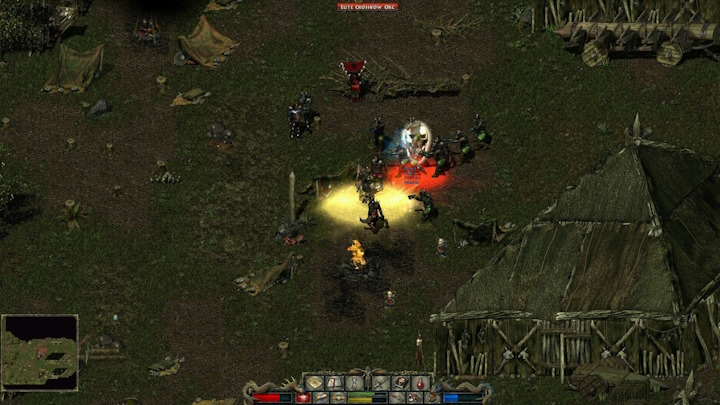
Trial and error
The game was just a tiny bit short of perfection. Not so much that it would be lost in the mists of history, but some of the solutions are simply tiring. As with Larian - the stability of the game was debatable. I remember a bug that forced skipping one of the main threads and a few scenes, because after going through it, the program would invariably crash to the desktop. Once I forfeit this quest - I could continue the game. There were also minor bugs and accidental crashes to the glorious Windows XP desktop.
Equipment management also was problematic. We just stuffed the backpack with everything that wasn't nailed to the floor and soon, uncontrollable chaos ensued. Problems with equipment management still occur in Larian's games today. Divine Divinity also had problems with balancing skills and artifacts, but this was the price of the freedom and momentum of a relatively small team. With so many variables, something must have gone wrong. It's also a shame that Larian didn't attempt to introduce a multiplayer - even some makeshift co-op would suffice. Traversing such a big world with friends would be great.
Nonetheless, the shortcomings, although noticed by the press and players, did not negatively affect the reception of the game. It received quite high marks and competed for many awards, although it lost to Neverwinter Nights and Morrowind. The graphics, which critics turned up their noses at on the day of release, are only an advantage now - they have aged much better than Never Winter Nights or the third Elder Scrolls. I couldn't find exact data, but according to Swen Vincke, the game sold really well and also received high ratings (usually around 8/10).
Most importantly, Divine Divinity was Larian's first step towards overhauling the entire RPG genre. It was a path full of problems, trials and errors. The publishers were grumpy and didn't always treat the studio fairly. The following games hit the mark sometimes, and other times they turned out moreof not-entirely successful experiments. While Beyond Divinity leaned more towards team-based and tactical combat (we controlled two heroes - a paladin and a black knight), Divinity 2 took inspiration from Gothic and Elder Scrolls, as it focused on action and third-person perspective, while Dragon Commander married RPG with strategy.
Each of these was a significant production, the studio drew conclusions from all of them. These - and the disappointment with mediocre publishers - led to a kickstarter campaign that financed the creation of Divinity: Original Sin. A new engine, a vast world, a turn-based combat system, and a great co-op won the hearts of players. Then came even better Original Sin 2, and most recently a game that needs no introduction - Baldur’s Gate 3. However, none of these giants would exist without a more humble ancestor - the Divine Divinity.

RetroGaming
We have been developing the RetroGaming series since March 2024. Here, you'll find the text that makes up its composition. Below we link to the previous text:
- Thanks to this game, survival horrors were born. Alone in the Dark impressed with its atmosphere and crushed with its graphic design.
- Ruthless rally games - Richard Burns Rally is still unrivaled today.
- Players agree: Cyberpunk 2077 is the only game where important open-world mechanics are absolutely unnecessary
- Baldur's Gate 3 after 2.5 years is doing numbers that most live service games can only dream of. Swen Vincke speaks out
- Todd Howard was too busy. Former Bethesda employee points out Starfield's main issue
0

Author: Hubert Sosnowski
He joined GRYOnline.pl in 2017, as an author of texts about games and movies. Learned how to write articles while working for the Dzika Banda portal. His texts were published on kawerna.pl, film.onet.pl, zwierciadlo.pl, and in the Polish Playboy. Has published stories in the monthly Science Fiction, Fantasy, and Horror magazine, as well as in the first volume of the Antologii Wolsung. Lives for "middle cinema" and meaty entertainment, but he won't despise any experiment or Fast and Furious. In games, looks for a good story. Loves Baldur's Gate 2, but when he sees Unreal Tournament, Doom, or a good race game, the inner child wakes up. In love with sheds and thrash metal. Since 2012, has been playing and creating live action role-playing, both within the framework of the Bialystok Larp Club Zywia, and commercial ventures in the style of Witcher School.
Latest News
- Butcher's Summit, an impressive free diselpunk FPS, has been released
- Free FPS on Half Life engine gets big update
- On February 3, gaming history could change forever. Red Dead Redemption 2 one step away from a major achievement
- This is not the RPG you expected. Crimson Desert abandons the key elements of the genre, going for original solutions
- Nintendo may unexpectedly beat Sony. State of Play is not to be the only game show awaiting players in February
